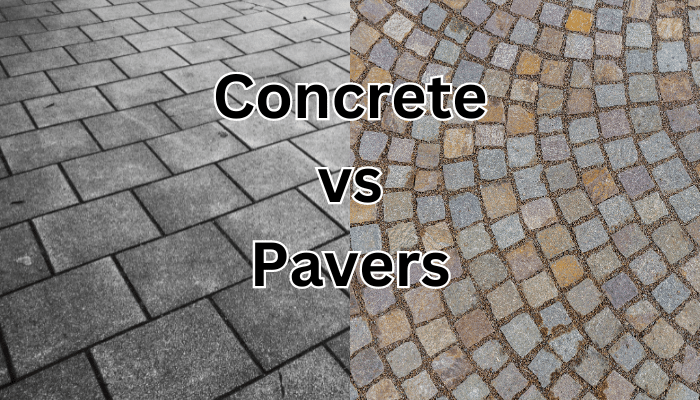Concrete vs Pavers: Learn the Difference
You may want to finish landscaping projects as the seasons change. During hardscape and pool consultations, one of the most frequent things people think is, which is the better outdoor material, concrete or pavers? The decision over which surface is the best investment for your house may not be obvious at first. This blog provides a comparison of the benefits and drawbacks of concrete and pavers to help you decide. Let’s end the debate of concrete vs pavers once and for all.
Concrete:
Concrete can be distinguished by the kind of cement or aggregate that is used, by the unique properties it exhibits, or by the production techniques employed. The ratio of cement to water in regular structural concrete greatly influences the concrete’s characteristics. In the nation, concrete is the most used material for patios. Concrete patios have endless design possibilities and exceptional durability.
Pavers:
Pavers are composed of various materials such as brick, and natural stone. When different kinds of clay are mixed and cast into forms, they can be heated and naturally obtained in a variety of hues. They are long-lasting and durable. Usually, these are utilized to make stepping stones or outdoor flooring. Depending on the kind of paver you’re interested in, they can be created by pouring concrete into a mold or using different techniques.
Pros and Cons of Concrete
Concrete are among the most often selected patio designs. If this is something you are thinking about doing for your house or business, it is helpful to understand the pros and cons of concrete patios so you can decide if this is the best option for you.
Pros:
Concrete brings a lot of benefits with it. Let’s put a light on the pros of it.
1. Durable:
Due to its remarkable resilience, concrete is a long-lasting building material. Compared to other building materials, concrete construction has a longer lifespan. Extreme weather, rust, reactions to chemicals, smoke, erosion, tensile stress, and scratching are all things it can withstand.
2. Low Maintenance:
Concrete requires minimal to no upkeep after it is poured and hardened. It doesn’t require any protective coatings to stay in good condition. Concrete requires far less care than steel or wood because its coatings may be renewed and replaced on a regular basis.
3. Economical:
Concrete is considered to be one of the most economical materials. The cost of producing cement concrete is significantly lower than that of engineered cementitious materials when it comes to construction. We suggest you hire professionals for residential concrete services.
4. Versatility:
Concrete is tough and powerful once it has solidified, although it is very flexible when it is first created, making it a versatile material.
Cons:
Let’s discuss the cons of concrete.
1. Repairing:
Concrete often needs repairing. This is what it lands in the cons area. It will break frequently in extreme weather conditions. These fissures are frequently costly and challenging to repair. There are situations when they might need to remove and repour a sizable section of concrete.
2. Weak Tensile Strength:
When measured against many other building materials, its tensile strength is incredibly low. Concrete is prone to chipping and cracking, damage that will only worsen with time.
3. Prone to Water Seepage:
Although concrete is strong, they are permeable and let water in. Water is tenacious and will take the easiest route.
Pros and Cons of Pavers
The pros and cons of using pavers for your outdoor living area are many. Here are some of them.
Pros:
Numerous advantages are associated with pavers. Let’s highlight it.
1. Easy Installation:
The paper is easy to install. The best aspect of the installation is that you can go for a walk, and drive over it the same day because there is no downtime needed for it to cure or dry.
2. Affordability:
The most economical approach to transform your driveway or patio’s game to the next level is to install pavers. They are very affordable as compared to concrete.
3. Weather resistance:
Extreme weather is a constant threat to outdoor construction. Additionally, it permeates the material and gradually weakens it because of its inherent porosity.
4. Customizable:
Since pavers come in a variety of sizes and forms, you may select from a wide range of styles that will best complement the external decor of your home.
Cons:
Want to know what disadvantages pavers brings with it? Let’s discuss.
1. Expensive:
Even terrain is necessary for leveling and laying patio pavers. Both labor and machinery are more expensive when used in this procedure. In addition, the cost of installing a patio is also relatively significant. This raises the cost of the landscaping project overall compared to alternative solutions.
2. Repairing:
Sinking pavers is another problem that can be difficult and time-consuming to address. To restore the pavers to their original position, you will need to labor hard and apply more filler in between them.
3. Slow Installing Process:
Paver installation is a labor-intensive procedure. It requires so much time to build pavers. Installation may take up to several days.
Conclusion
Pavers are far more resilient and can sustain heavy traffic without exhibiting wear, but concrete is more likely to shatter and crack with time along with losing its color. Pavers provide any outdoor space with a natural elegance that concrete just cannot match in terms of beauty. Concrete has its own advantages and disadvantages while pavers have their own. In this blog, we have discussed the concrete vs pavers pros and cons, which might help you in deciding which one to choose. Whether you go for concrete or paver, get them installed by a reliable and well-known company. Only professionals and skilled workers can perform these crucial tasks effectively and skillfully. They specialize in the industry and are experts in what they offer.
Read also, How to Clean Concrete Pavers

